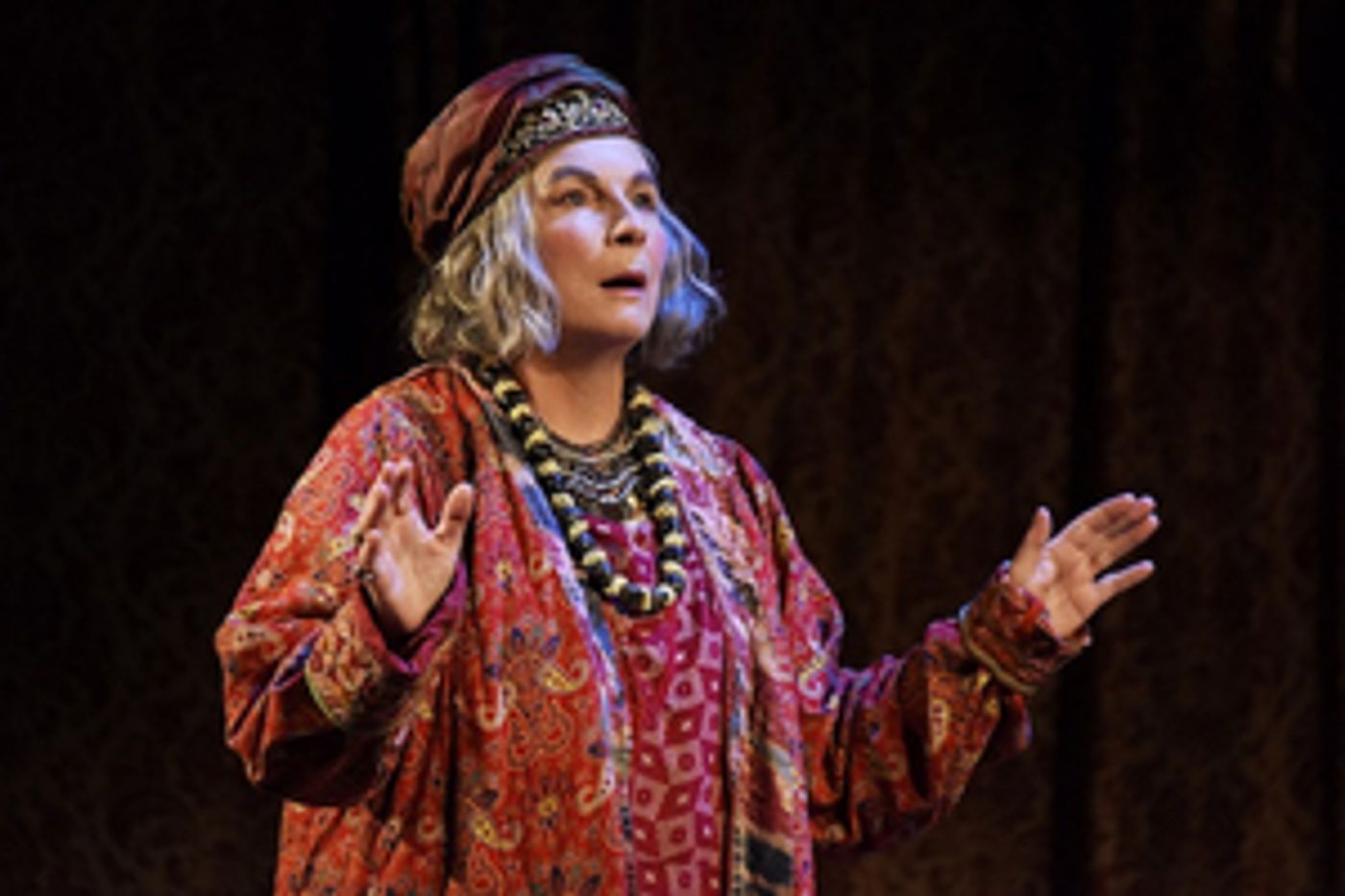Review: BLITHE SPIRIT, Duke of York's Theatre

![]() This is perhaps an odd time for Nöel Coward's comedy about death and supernatural apparitions to land in the West End - Richard Eyre's revival transferring from Theatre Royal Bath. On the other hand, there's something comforting about Coward's wartime portrait of the afterlife as essentially a continuation, with our personalities, desires and enmities very much intact. Plus the opportunity to socialise with Joan of Arc.
This is perhaps an odd time for Nöel Coward's comedy about death and supernatural apparitions to land in the West End - Richard Eyre's revival transferring from Theatre Royal Bath. On the other hand, there's something comforting about Coward's wartime portrait of the afterlife as essentially a continuation, with our personalities, desires and enmities very much intact. Plus the opportunity to socialise with Joan of Arc.
The undoubted star of this production is Jennifer Saunders as the eccentric medium Madame Arcati, who holds a séance in the Condomines' living room - novelist Charles hoping to gather material for his next book - and accidentally raises the ghost of Charles's first wife Elvira, much to the consternation of current wife Ruth.
Coward has a lot of fun clashing the spirit world with the mundane and domestic (ghost Elvira criticises the new décor, bickers with Charles about long-past romantic liaisons, and demands a lift into town to visit friends), and Saunders takes that a step further by delivering a decidedly earthy spiritualist.
Though her Madame Arcati takes her vocation very seriously, she's equally engaged by matters of an earthier nature, whether relishing a good sandwich or gin martini, or airing her clothing after a vigorous cycle ride - with frequent flashes of petticoat. With her wide-legged stance and gruff voice, her clairvoyant has the air of the stoic countrywoman or PE teacher; she could just as easily be mucking out a stable or cheering on her minor-public-school hockey team as communing with ghosts.
It's a very funny take, and the ever-watchable Saunders goes big with an absurd dance, warbling song and dramatic faint, but it's symptomatic of a production that plays very broadly, and - in milking every bit of comic business - too slowly, weighing down Coward's swift wit and lacking the crisp pace of a really successful farce. One starts to wish that the frequently swilled gin martinis were extended to the audience.
It also gives us too much time to get ahead of the plot and to analyse elements that don't play as well in 2020, most glaringly Charles's callous treatment of both wives, who in turn get stuck in a wearying sexpot-versus-shrew rivalry. It's a dynamic better explored in the relatively nuanced and subversive Private Lives - or when a director makes more radical choices with Coward, as Matthew Warchus did with his inspired Present Laughter.
Nevertheless, Geoffrey Streatfeild is convincing as the carefree, solipsistic writer who becomes alternately exasperated, amused and tempted by this strange ménage à trois. Particularly effective is the first section in which only Charles can see Elvira, and so he talks at frustrating cross-purposes with Ruth. Streatfeild also conveys a wistful longing for this naïve, youthful - although, as soon becomes apparent, doomed - first marriage.
However, the latter aspect also requires crackling chemistry between Charles and Elvira, and that's lacking here. Emma Naomi's version comes across as a stroppy modern teen, distinctly at odds with this scrupulously period production, and there's little sense of a pair once bound by intense but volatile passion - in contrast with Charles's more staid marriage to Ruth.
The always wonderful Lisa Dillon brings more colour than usual to the latter, suggesting that beneath her carefully controlled, demure façade is a woman with every bit as much fire as Charles. Ruth's frequent cry of "Dar-LING" becomes increasingly strained, and her determination to maintain social civility in extraordinary circumstances itself seems a kind of madness.
There's good support from Simon Coates's perturbed doctor and Lucy Robinson's delightfully giggly Mrs Bradman, but the real comic rival to Saunders is Rose Wardlaw in the scene-stealing slapstick role of maid Edith. She either sprints breathlessly or slow-motion tiptoes, adds an extra punchline to scenes through her panicked reactions alone, and contributes to a genuinely spooky climax.
Anthony Ward's sumptuous period set is heaving with books - a visual comment on Charles's egocentricity - and the combination of Paul Kieve's illusions, John Leonard's sound and Howard Harrison's lighting cleverly evoke the supernatural.
Yet overall, Eyre's production feels effortful. With everything pitched at an hysterical level, the real comic gems get buried, and it's hard to invest in these people as actual human beings, rather than amusing sketch characters. Worth a trip for Saunders's spiritualist, and there's plenty here to raise the spirits in dark times, but not a classic Coward production.
Blithe Spirit at the Duke of York's Theatre until 11 April
Photo credit: Nobby Clark
Reader Reviews
Videos

